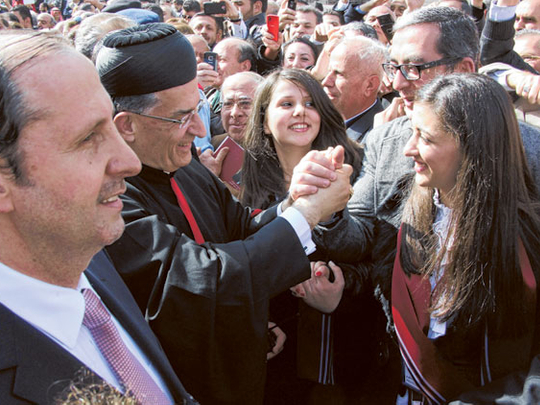
Damascus: Syria’s Greek Orthodox Church enthroned a new patriarch during a ceremonial mass in Damascus on Sunday amid civil war.
John Yazigi, 57, replaces Ignatius Hazim as the Eastern Orthodox Patriarch of Antioch and All the East. Hazim died in December.
Snipers deployed on the rooftops around Holy Cross church in the heart of Damascus as dignitaries from Middle East churches arrived for the enthronement of Greek Orthodox leader Yuhanna X Yazigi.
Guests bearing official invitations were whisked through metal detectors at the door, but their chauffeurs were prohibited from parking, and throngs of devotees had to watch the liturgy on a giant screen outside.
Only Maronite Patriarch Beshara Rai, on a historic visit from neighbouring Lebanon, and Catholic Patriarch Gregory Laham represented their churches in person.
Other denominations sent representatives, a member of the organising committee told AFP outside the church in the city’s Qasaa district.
Presidential Affairs Minister Mansour Azzam, a key adviser to Bashar Al Assad, was among ministers representing the embattled government at Yazigi’s enthronement as Patriarch of Antioch and All the East.
The ceremony comes just a day after warplanes raided southern districts of the capital, the latest chapter in the nearly two-year conflict in which the United Nations says that more than 60,000 people have been killed.
Many Syrian Christians have distanced themselves from the revolt, which morphed into an insurgency amid a harsh crackdown on peaceful protests, but others have taken Al Assad’s side, fearing a rise of Islamism or an Iraq scenario.
Lebanese Christians, on the other hand, are deeply divided between pro- and anti-Al Assad camps.
Rai, who has denounced states that supply money and weapons to both the Al Assad regime and its opponents, is the first Maronite patriarch to visit Syria since Syrian and Lebanese independence seven decades ago.
In a sermon after his arrival on Saturday evening, Patriarch Rai said: “Reforms are necessary, but should not be imposed from the outside. They must come from within through dialogue and agreement.”
Rai, whose church has 900,000 members in Lebanon, a quarter of the country’s population, is on the first visit to Syria by a Maronite Patriarch since the independence of neighbouring Lebanon in 1943.
“[I pray] that the consciences of local, regional and international leaders are inspired to put an immediate end to the war in dear Syria... and bring peace through dialogue,” he told dozens of worshippers inside the church.
Lebanon’s Maronite leaders have had tense relations with Syria and led calls for an end to its military presence in Lebanon in 2005. But since the civil war flared, Christians have been uneasy about supporting rebels against Al Assad’s secular Baathists who ensured freedom of belief for minority faiths.
Rai himself has criticised the Arab Spring and said that violence and bloodshed is turning it into winter. He has always been careful not to be seen supporting either side in the Syrian conflict but has adopted a position close to Al Assad’s by saying reforms should not be imposed from outside.
Clashes between government forces and rebels continued on Sunday across Syria, including in the provinces of Aleppo and Idlib and on the edge of Damascus, close to the heart of the capital, where fighting has raged for four days.
Rai, 72, said he was saddened to see people fleeing the capital as his convoy was driving into Damascus.
Walking towards the altar to say mass, he blessed visibly emotional worshippers with a cross and repeatedly told them: “God protect you, God be with you.”
Divisions in the opposition and among the international powers over Syria have deprived Syria’s rebels of desperately needed arms to confront Al Assad’s heavily armed forces.












